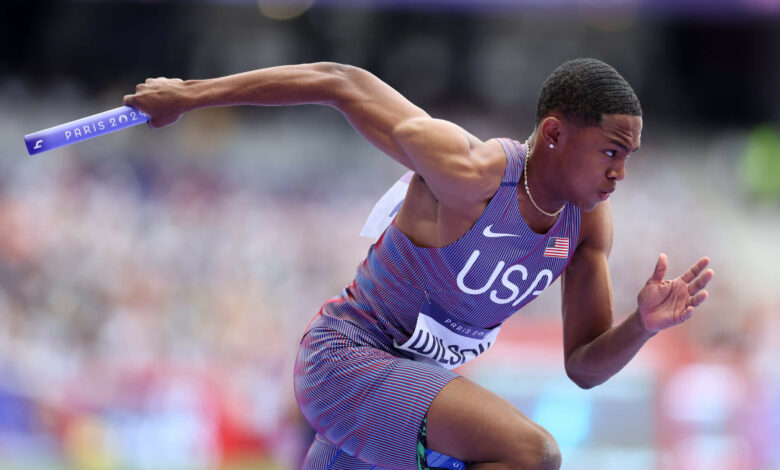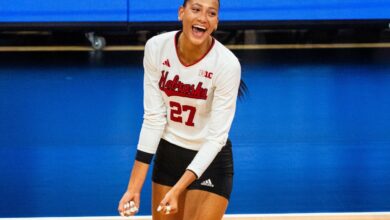Quincy Wilson gets a humble taste of the Olympics — but it’s just the beginning

SAINT-DENIS, France — For the first time since the spotlight began shining on the phenomenon of Maryland’s Bullis School, Quincy Wilson wasn’t smiling. The infectious charm that had made him so beloved in recent months was replaced by a stern expression.
Wilson ran the first leg for the U.S. in the opening round of the men’s 4×400-meter relay in Friday’s early session. He set the tone, running his lap in 47.27 seconds — seventh in the eight-man field. And the kid wasn’t happy about it.
Three weeks ago, after becoming a sensation at the U.S. Olympic trials, Wilson set a new personal best by running the 400 meters in 44.20 seconds at the Holloway Pro Classic in Gainesville, Florida. He didn’t come close to that at Stade de France.
“It was awesome,” Wilson said, his million-watt smile noticeably absent. “I was there with a great team that was by my side the whole time. I wasn’t 100 percent myself, but a team came out here and did it for me.”
When asked about the context of not being 100 percent himself, he politely declined to answer. No excuses.
But he doesn’t need one. Wilson may be the only one disappointed.
The Americans recovered and qualified for the final. No harm done. The US can still become champions in the final on Saturday.
Wilson will most likely be replaced for the final round. That was certainly always the plan, as the United States has elite options in the single-lap discipline.
Quincy Hall just won the gold medal in the men’s 400 meters. If he’s healthy and has the legs, he’s almost certain of gold. The same goes for Rai Benjamin, who will be going for gold in the men’s 400 meter hurdles final on Friday night. Benjamin is a relay legend who has an Olympic gold medal (Tokyo) and two World Championship gold medals in the 4×400 meter relay.
“It’ll be better tomorrow,” said teammate Vernon Norwood. “I guarantee it.”
Wilson’s significance was much less about his time and much more about his presence. He made history by becoming the youngest man to compete in the Olympics for America.
Norwood said he was so caught up in the moment, watching the 16-year-old make Olympic history, that he had to refocus himself for the handover.
16-year-old Quincy Wilson makes his Olympic debut, becoming the youngest male athlete to compete for the United States at the Olympics. 🇺🇸 #Olympic Games in Paris
📺 USA Network & Peacock photo.twitter.com/XJ4HudX0Dx
— NBC Olympics & Paralympics (@NBCOlympics) August 9, 2024
“I’m so proud of him for coming here and showing his mettle for us, for the United States,” Norwood said. He added: “It’s amazing. I told him before we left. I said, ‘Hey, embrace it. You belong here. This is a privilege. Nobody else in this world gets this opportunity, so make the most of it.'”
Additionally, USA Track and Field regained its dominant position at the Paris Games and Wilson is a leading candidate for the country’s bright future in the sport.
It’s clear that’s the reality he was put on this relay team for. The coaches chose to build Wilson up, to give him valuable experience for Los Angeles 2028, rather than reward another runner whose best days are behind him. Wilson is being groomed to be a successful Olympian.
“Absolutely!” said female hurdler Masai Russell — who also attended Bullis and is close to Wilson — when asked if she was proud of him. “When he was super sad that he didn’t make the (4×400 mixed) relay, I was like, ‘You know, you’re 16. People would die to be in your shoes. … Some people who have been running track their whole lives never make the team. … And I’m glad he got the chance to run, so he could experience that atmosphere. Because it’s pretty intense. So I know it’s going to be a different story when he comes back.”
Wilson didn’t want to hear all that in the immediacy of 47.27.
And perhaps that is the best thing that came out of his Olympic debut. The young man was not content with just being here. If he needed more motivation, he got it by being humiliated on the Olympic podium.
“He’s a competitor,” Russell said. “Guys are just competitive in general. But he’s super competitive. Like, we played (air) hockey together and I was like, ‘Oh. … He doesn’t play games.’ … I lost by, like, five.”
You just know that Wilson — with his whole family in the crowd and his whole world in Maryland watching — was going to do something special in his first-ever Olympic appearance. He’s watched everyone else compete, made history, and waited for the chance to do it himself. He seems to do that every time he steps on the track. He’s already set three under-18 records this season.
After making American track and field history, 16-year-old Quincy Wilson’s competitors showed him their love after the race. ❤️ #Olympic Games in Paris photo.twitter.com/lXfg0jJYnd
— NBC Olympics & Paralympics (@NBCOlympics) August 9, 2024
But for the first time since the sports world knew the name Quincy Wilson, he looked like a 16-year-old running against grown men on the track.
He shot out of the blocks in lane 4 and held his ground for the first 200 meters, but it looked like he was going too fast, perhaps driven by the adrenaline and excitement of making his debut on the biggest stage of his life.
The youngster began to die in the second bend and struggled on the straight. The strength and experience he still needs were evident as he entered the final stretch in sixth place. Fatigue had thrown his form off balance as 20-year-old Maksymilian Szwed of Poland passed Wilson with ease. The only runner with a worse time in the heat was Renny Quow of Trinidad and Tobago.
To make matters worse, Botswana switched and put Letsile Tebogo, the new 200m champion, in the first leg. He ran at breakneck speed, clearing the field to give his country the lead and picking up the pace as he went.
Wilson, however, gave it his all. Exhausted and no doubt embarrassed, he nearly came to a standstill before handing over the baton.
Fortunately for the US, Wilson had some grown men behind him. And a crowd cheering him on.
“They got me around the track today,” he said. “My grit and determination got me around the track. I knew I had three great legs behind me, and I knew it wasn’t just me today. If it was just me, we’d be in last place.”
Norwood immediately made up ground with a monstrous second stage, gradually picking up speed and bringing America along with the rest of the pack. His 43.54 seconds was the fastest of any stage in the first lap, beating Britain’s star Matthew Hudson-Smith, who ran 43.87. They were the only two under 44 seconds.
Then Bryce Deadmon took over from Norwood and America shot up two spots to fourth after the first turn. Deadmon set the fastest third leg and brought the US right on the heels of third. Anchor Christopher Bailey still had work to do.

“It’s just going to be motivation for me,” Quincy Wilson said of his Olympic debut, “to give my team a better chance than they had today.” (Hannah Peters/Getty Images)
With America back in the mix and Botswana far out in front, Bailey was patient at first. Then, with about 150 meters to go, he turned it on and passed Japan to secure third place and America’s automatic qualification into the final round.
“That was the plan,” Norwood said. “We put him up front. We didn’t want to give him too much responsibility. So my job was to pick up as much as I could.”
Wilson’s best hope for reaching the final was to do something special. His frustration at not coming close was visceral. His Olympic debut lasted about two or three seconds too long and yet was over so quickly.
One day, he will benefit from the lessons he learned Friday at Stade de France. He will see this experience as essential for the Olympian he will become. He could even walk away with a medal, since the preliminary round runners are also rewarded, not just the four in the final.
But at that moment, Wilson seemed far more angry than grateful. What’s inside him, what brought him to this big stage, doesn’t allow him to put his performance aside so easily. That explains why he feels like he’ll definitely be back on this stage.
“It’s just going to be motivation for me,” Wilson said, “to give my team a better chance than they had today.”

GALLING DEEPER
For teenage track star Quincy Wilson, everything is different now – Olympics or not
(Top photo of Quincy Wilson competing in the 4×400 meter relay on Friday: Christian Petersen/Getty Images)




